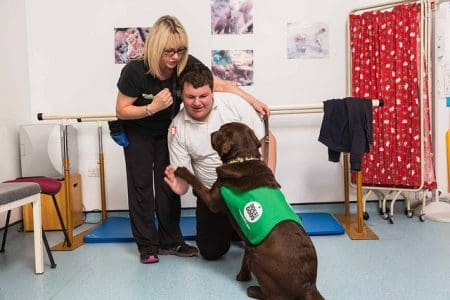Dogs for Good has welcomed the news today that the Royal College of Nursing (RCN) is working to produce national guidelines to allow more animals to visit hospitals. 
The RCN commenced its work after it found that there were scores of anecdotes around the benefits that animals can bring to help outcomes around healthcare, something that Dogs for Good recognises through the charity’s work training assistance dogs and therapy dogs.
Peter Gorbing, chief executive of Dogs for Good said: “The benefits of owning a pet are well documented, but as a wider society, we often fail to appreciate the impact that animals make to our lives. A recent study by the University of Lincoln and Dogs for Good estimated that pet ownership could be saving the NHS an estimated £2.45bn a year – primarily the result of fewer visits to the doctor and improved mental wellbeing. If we consider how we could use dogs and other animals therapeutically to help people the benefits could be even wider.”
Dogs for Good’s community dogs and specially trained handlers work alongside health and educational professionals to offer a range of therapeutic support and activities to help people with a wide variety of conditions including autism, learning difficulties, dementia and people with brain and spinal injuries. Peter Gorbing explained: “We have seen some significant benefits through our animal assisted intervention work and in a broad range of environments including hospitals, social care and special educational needs schools. This included one group of teenagers with learning difficulties who were helped to receive annual vaccinations as a result of a programme activity with the school’s community dog. In another project, Dogs for Good has commenced a pilot with Stoke Mandeville hospital to explore the benefits of a specially-trained dog and specialist handler working alongside the occupational therapy team to help patients with spinal injuries in their rehabilitation.
“We hope that these nationwide guidelines will help to provide a framework for healthcare settings to follow, allowing more patients to benefit from therapeutic sessions with animals. Many hospitals assume that dogs and other animals pose a hygiene or health risk so have adopted a blanket ban on welcoming animals, but this work could help to dispel any myths and address concerns so that staff, patients and animals can have appropriate protection.”
Dogs for Good is a founder member of Animal Assisted Intervention International (AAII) and has been instrumental in developing global standards for Animal Assisted Intervention, as such we would be keen to contribute this learning and our own experience to the work the RCN is doing.